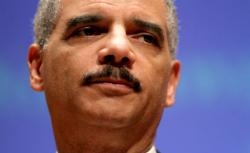In his speech Monday explaining when he thinks the U.S. government can kill American citizens, Attorney General Eric Holder offered bare bones without much meat. We know now that the Obama administration thinks its lawyers don’t have to get a judge’s approval before a top government official makes the call to assassinate someone. As Holder put it, ” ‘Due process’ and ‘judicial process’ are not one and the same, particularly when it comes to national security.” We know that the internal review process includes some limits. As Adam Serwer explains, “The target has to pose an ‘imminent threat of violent attack’ to the United States and be beyond the ability of American authorities to capture, and the strike can’t violate international standards governing the use of force by killing too many civilians or noncombatants.”
But that’s about it. Holder didn’t explain how the administration arrived at the conclusion that due process within the executive branch is enough. He has refused to release the legal memo from the Office of Legal Counsel at the Department of Justice that must lay out how the administration got to here from there—the meat that was missing from his speech. And he didn’t say how the government arrived at the conclusion in September that it was OK to kill not just Anwar al-Awlaki, the radical American cleric in Yemen whom the government says is linked to underwear bomber Umar Abdulmutallab, but also Awlaki’s son, Abdul Rahman al-Awlaki, who was also an American citizen.
If you want to believe that the government does its grim best to fight terrorists, and you’re inclined to think that their dirty tactics justify some ruthlessness on our part, then maybe a few killings of bad guys in faraway lands doesn’t bother you much. But there are a couple of unsettling implications here that are so obvious that it’s amazing Holder thinks he need not address them. The first is that if the Obama administration claims this kind of extra-judicial power for a few cases, what’s to stop the next president from expanding upon it—and citing this step as precedent for taking others that Obama wouldn’t countenance? And the second is that when the executive branch won’t release the legal memos that underlie its decision-making, we’re blocked from evaluating how strong or weak the arguments are. When the federal government takes a bold and new step like this, testing the boundaries of the Constitution, it’s crucial for Holder and his lawyers to explain how and why. Instead, we’re being asked to take the wisdom of the president and his national security apparatus for granted.
That’s a precedent that the Bush administration set in the bad old days of Attorney General John Ashcroft. It was this Department of Justice that produced John Yoo’s legal memos approving waterboarding and other interrogation techniques that amount to torture, the finding that the Guantanamo detainees weren’t prisoners of war protected by the Geneva conventions, and approved of warrantless wiretapping. Yoo’s legal innovations were dizzying—to put it kindly—and the leaking of his memos in 2004 was the first step toward official Department of Justice repudiation of them.
Maybe the Obama administration is standing on more solid legal ground with its targeted assassinations, and maybe not. The point is that this is the fully informed conversation worth having, not the skeleton version Holder is now offering. The New York Times and the ACLU have each gone to court arguing that the memos should be made public. Holder, of course, doesn’t need a court order—he could disclose his department’s legal reasoning himself. Until he does, it’s hard to see what more speeches will accomplish. If you were a critic before, you remain one now. Maybe even more so.
